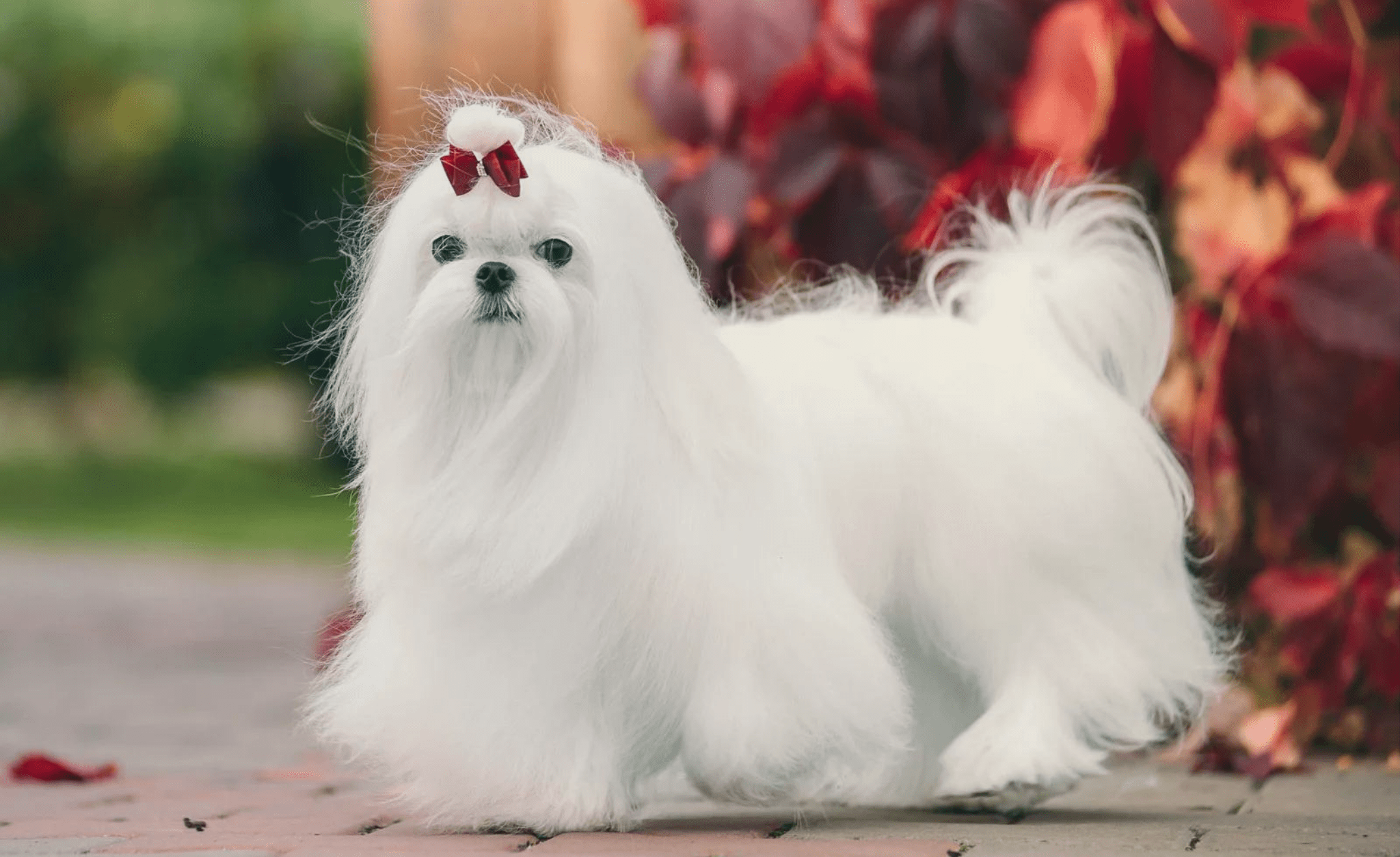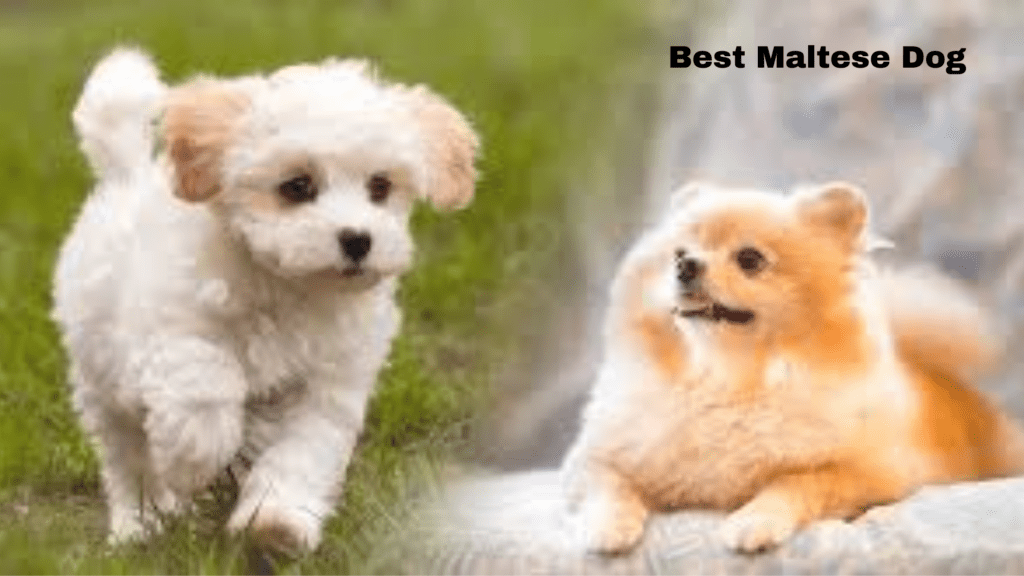Guidance and Information About Maltese Dog:
The Maltese dog is a small breed dog of toy dog known for its long, silky white coat and gentle demeanor. Here are some key facts about Maltese dogs
Appearance of Maltese Dog:
The Maltese dog has a distinctive appearance that sets it apart from other breeds. Here are some details about the appearance of a Maltese:
- Coat:
The most notable feature of the Maltese is its long, silky, and pure white coat. The hair is fine and straight, without any curl or wave. The coat can grow to considerable length, often reaching the floor if left untrimmed. Some owners choose to keep the coat trimmed shorter for easier maintenance.
- Body:
The Maltese have a compact and well-proportioned body. It has a level topline, meaning the back is straight and level from the withers to the tail. The chest is moderately deep, and the abdomen is slightly tucked up.
- Head:
The head of a Maltese is slightly rounded, with a moderately long muzzle. The eyes are dark, round, and set well apart. They have a sweet, alert expression. The nose is black, and the lips are black or dark brown. Maltese dogs have a strong jaw with a scissor bite.
- Ears:
The Maltese have drop ears, which means they hang down close to the head. The ears are covered with long hair, blending with the rest of the coat. Some owners choose to keep the hair on the ears trimmed shorter to prevent tangling or to tie them up in a topknot.
- Tail:
The tail of a Maltese is set high and carried over the back. It is covered in long, flowing hair that matches the rest of the coat.
- Height:
On average, Maltese dogs stand about 8 to 10 inches (20 to 25 centimeters) tall at the shoulder. This measurement is taken from the ground to the highest point of the shoulder blades.
- Weight:
Maltese dogs are lightweight and typically weigh between 4 to 7 pounds (1.8 to 3.2 kilograms). However, individual dogs may fall slightly outside of this range, with some being a bit smaller or larger.
Temperament of Maltese Dog:
The Maltese dog is known for its delightful temperament. Here are some key traits of their temperament:
- Affectionate:
Maltese dogs are extremely affectionate and thrive on human companionship. They love to be around their family members and enjoy cuddling and being lap dogs. They are known for their devotion and loyalty to their owners.
- Playful:
Despite their small size, Maltese dogs have a playful and energetic nature. They enjoy interactive play sessions and games with their family members. Providing them with toys and engaging in playtime helps keep them mentally stimulated and happy.
- Gentle:
Maltese dogs have a gentle and sensitive nature. They are generally well-mannered and exhibit a calm demeanor. This makes them suitable companions for families with older or considerate children, as they may be easily injured by rough handling due to their delicate size.
- Alert and Watchful:
Maltese dogs have a keen sense of awareness and make good watchdogs. They are quick to alert their owners to any approaching strangers or unusual sounds. However, due to their small size, they are not typically effective as guard dogs.
- Sociable:
Maltese dogs are typically friendly and get along well with people and other pets. They are known to be social butterflies and can adapt well to various social environments, such as visiting friends or going to dog-friendly events. Proper socialization from an early age helps ensure they grow up to be well-rounded and friendly companions.
- Intelligent:
Maltese dogs are intelligent and quick learners. They are generally eager to please their owners, which makes them relatively easy to train. Consistent and positive reinforcement training methods work best with this breed.
Health of Maltese Dog:
Maltese dogs are generally healthy, but like all dog breeds, they can be prone to certain health issues. Here are some common health concerns associated with Maltese dogs:
- Dental Problems:
Maltese dogs are prone to dental issues such as tooth decay, gum disease, and early tooth loss. Regular dental care, including daily tooth brushing and professional cleanings, can help maintain good oral health.
- Allergies:
Maltese dogs can develop allergies, including food allergies, environmental allergies (such as pollen or dust mites), or contact allergies (such as certain grooming products or fabrics). Identifying and managing allergies may involve dietary adjustments, allergy testing, and avoiding triggers.
- White Shaker Syndrome:
This neurological condition primarily affects white-coated breeds like Maltese. It causes tremors and shaking throughout the body. Medication can help manage the symptoms.
- Hypoglycemia:
Maltese dogs are prone to low blood sugar levels, particularly when they are young or during times of stress. It’s important to monitor their eating habits and provide small, frequent meals to prevent hypoglycemic episodes.
Lifespan of Maltese Dog:
The average lifespan of a Maltese dog is typically between 12 to 15 years. However, with proper care, some Maltese dogs have been known to live even longer, sometimes into their late teens. The lifespan of an individual Maltese can be influenced by various factors, including genetics, overall health, diet, exercise, and living conditions.
To help ensure a longer and healthier life for your Maltese, it is important to provide them with a nutritious diet tailored to their needs, regular exercise to maintain a healthy weight, routine veterinary check-ups, vaccinations, and preventive care. Additionally, providing a safe and loving environment with mental stimulation, proper dental care, and regular grooming can contribute to their overall well-being and longevity.
It’s worth noting that while genetics play a role in determining a dog’s lifespan, individual variations can occur, and some Maltese dogs may experience health issues that can impact their lifespan. Early detection and treatment of any health concerns can help manage these issues and potentially extend their lifespan.

Conclusion:
In conclusion, the Maltese dog is a small and charming breed known for its beautiful long, white coat and gentle temperament. They are affectionate, playful, and enjoy being part of the family. While they are generally good with children and other pets, their delicate size requires careful handling.
Proper care and maintenance are essential for Maltese dogs. Regular grooming, including daily brushing, helps keep their coat looking its best. They require exercise, socialization, and mental stimulation to stay healthy and happy. Regular veterinary check-ups and a balanced diet contribute to their overall well-being.
FAQ’s
Are Maltese Dog Hypoallergenic?
Maltese dogs are often considered hypoallergenic. They have hair rather than fur, which reduces the amount of dander they produce. However, no dog breed is completely hypoallergenic, and individual reactions to allergens can vary.
Are Maltese Dog Good With Children?
Maltese dogs can be good with children, especially older and considerate children. However, due to their small size, they are more fragile and can be easily injured if mishandled.
Do Maltese Dog Require A Lot of Grooming?
Yes, Maltese dogs have long, silky coat that requires regular grooming. Some owners choose to keep the coat trimmed shorter for easier maintenance. Professional grooming every few weeks can help keep their coat in good condition.
Do Maltese Dog Bark A Lot?
Maltese dogs have a tendency to be vocal and may bark more than some other breeds. Early socialization and training can help curb excessive barking behaviors. Providing mental and physical stimulation can also help keep them content and reduce excessive barking.



